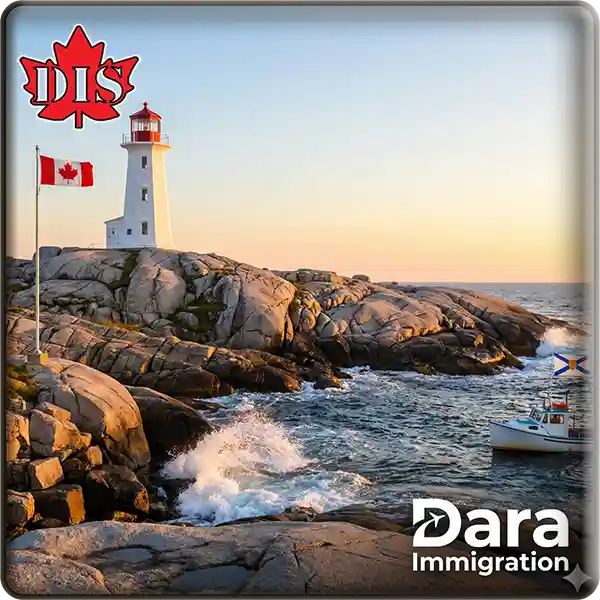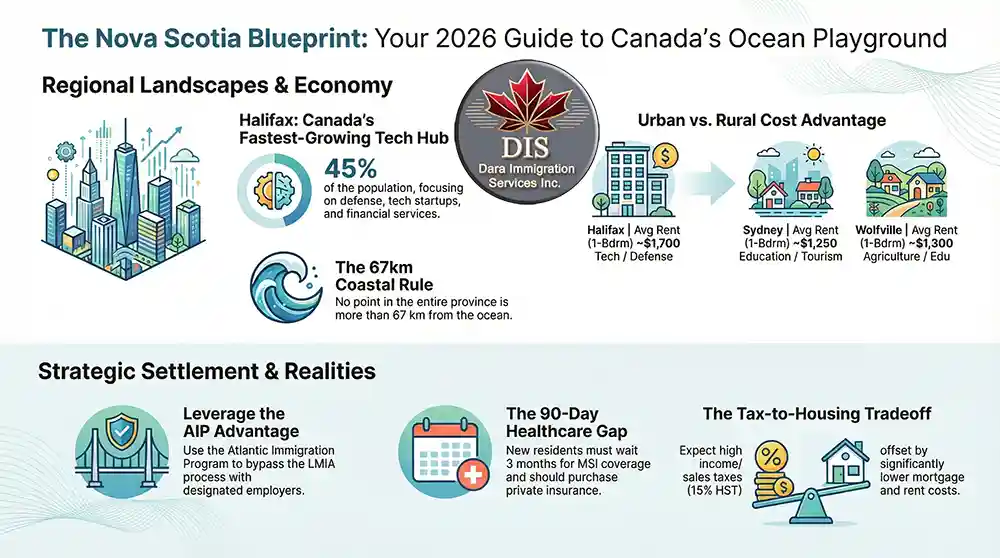Nova Scotia
Nova Scotia Overview 2026-2027
To choose Nova Scotia is to choose a life connected to the ocean. Known as “Canada’s Ocean Playground,” this province has transformed from a quiet maritime region into a booming tech and innovation hub. For the thousands of newcomers arriving in 2026, Nova Scotia offers the rare ability to build a world-class career in Halifax while living just 20 minutes from a sandy beach.

While housing costs in Halifax have risen, they remain significantly lower than in Toronto or Vancouver. The real draw, however, is the lifestyle: a slower pace, safer communities, and the Atlantic Immigration Program (AIP), which offers one of the most streamlined paths to Permanent Residence in the country.
At Dara Immigration Services, we help you navigate the opportunities of the East Coast. This guide is your blueprint to settling in Nova Scotia successfully, ensuring your move is as strategic as it is scenic.
Nova Scotia Overview: Economy & Lifestyle
Nova Scotia is the economic capital of Atlantic Canada. Its economy is diverse, anchored by the massive Halifax Shipyard (Naval defense), a rapidly growing Information Technology sector, and a billion-dollar export industry in seafood (lobster/scallops).
For immigrants, the standout feature is the Nova Scotia Nominee Program (NSNP) and its targeted draws for physicians, nurses, and early childhood educators. The province is actively recruiting to double its population, creating a welcoming environment for skilled newcomers.
Quick Facts: Nova Scotia at a Glance
- Capital City: Halifax.
- Population: Approx. 1.1 Million (2026 Estimate).
- Taxation: 15% Harmonized Sales Tax (HST).
- Key Immigration Stream: NSNP (Labour Market Priorities) & AIP.
- Minimum Wage: $15.00+ per hour (Indexed).
- Geography: No point in the province is more than 67 km from the ocean.
Cities & Economic Zones in Nova Scotia
To succeed in Nova Scotia, you must understand the distinction between the booming capital and the laid-back rural regions.
Halifax (HRM)
The Halifax Regional Municipality (HRM) is the fastest-growing city in Canada, home to 45% of the province’s population.
Economy & Labour Market
- Key Industries: Defense (Irving Shipbuilding), Technology (Volta Labs), Financial Services, and Higher Education (Dalhousie University).
- Employment Outlook: Excellent. Halifax is becoming a “Zoom Town,” attracting remote workers and tech startups. Administrative and IT roles are in high demand.
- Lifestyle & Culture: A vibrant, youthful city with a high density of pubs, breweries, and historic sites. The waterfront boardwalk is the social heart of the city.
- Cost of Living: Moderate to High. Vacancy rates are low (under 1%). One-bedroom rents average $1,700, but this is still half the cost of Vancouver.
Cape Breton Island (Sydney)
Separated from the mainland by a causeway, Cape Breton is world-famous for its beauty (Cabot Trail) and unique Celtic culture.
Economy & Labour Market
- Key Industries: Tourism, Education (Cape Breton University), and Healthcare.
- Employment Outlook: Cape Breton University has driven a massive influx of international students, creating a service and housing boom in Sydney.
- Lifestyle & Culture: Friendly and historic. Life here revolves around music (fiddling) and nature. It is significantly quieter than Halifax.
- Cost of Living: Affordable. You can find rentals for $1,100 – $1,300, and homes are priced well below the national average.
The Annapolis Valley
Known as the “Napa Valley of the North,” this region is the agricultural heartland of the province.
Economy & Labour Market
- Key Industries: Agriculture (Apples/Grapes), Wine Production (Michelin Tire Plant is nearby in Bridgewater/Waterville area), and Manufacturing.
- Employment Outlook: Steady demand for agricultural technicians and manufacturing workers.
- Lifestyle & Culture: Rural and scenic. Small towns like Wolfville offer a high quality of life with farm-to-table dining and university amenities (Acadia U).
- Cost of Living: Low. Rents are affordable (~$1,200), but a car is absolutely essential.
Cost of Living & Climate (2026)
Use this table to plan your budget. Halifax is the economic engine, but rural areas offer significant savings.
| City / Region | Avg Rent (1-Bdrm) | Key Industry | Climate (Jan) | Notes |
| Halifax | ~$1,700 | Tech / Defense | -5°C | Major Urban Hub |
| Sydney | ~$1,250 | Education / Tourism | -6°C | Cape Breton Hub |
| Wolfville | ~$1,300 | Agriculture / Edu | -7°C | University Town |
| Truro | ~$1,150 | Logistics / Textile | -8°C | “Hub of NS” |
| Bridgewater | ~$1,200 | Manufacturing | -6°C | South Shore Hub |
Note: Nova Scotia winters are wet and slushy rather than extremely cold, often hovering around freezing.
“How-To” Guide: Settling in Nova Scotia
Your transition to Nova Scotia requires planning, especially regarding healthcare and housing.
Pre-Arrival: The AIP Advantage
- Check AIP Eligibility: If you have a job offer from a “Designated Employer,” you can skip the LMIA process. This is the gold standard for moving to Nova Scotia.
- Budget for the Wait: Unlike some provinces, Nova Scotia (MSI) typically enforces a 3-month wait for health coverage. Buy private travel insurance for your first 90 days.
Your First Week: Essential Setup
- Apply for MSI: Visit Medical Services Insurance (MSI) to register. You will need your work permit and proof of address.
- Get a Driver’s License: Visit Access Nova Scotia. You have 90 days to swap your foreign license. Note that you may need to take a written test depending on your country of origin.
- Find a Family Doctor: Join the “Need a Family Practice” registry immediately. The waitlist is long (often 2+ years).
Long-Term: Integration
- Embrace the Weather: Hurricanes (tropical storms) are common in the fall. Prepare an emergency kit with batteries and water.
- Networking: Halifax is a “who you know” city. Attend “Halifax Partnership” events to build your local network.
Challenges for Newcomers in Nova Scotia
To succeed in Nova Scotia, you must be realistic about infrastructure and taxes.
Challenge #1: High Taxes
- The Reality: Nova Scotia has some of the highest income taxes and sales taxes (15% HST) in North America.
- The Strategy: Focus on the lower cost of housing. While you pay more tax, your mortgage or rent will likely be $1,000 less per month than in Ontario.
Challenge #2: Healthcare Access
- The Reality: The healthcare system is under strain. Over 100,000 residents are on the waitlist for a family doctor.
- The Strategy: Use “Virtual Care NS” (free for those on the waitlist) and walk-in clinics for non-emergency issues.
Frequently Asked Questions (FAQ)
- Is healthcare free in Nova Scotia?
Yes, but coverage is not immediate. There is typically a waiting period of up to 3 months for new residents. Once covered, MSI pays for medically necessary doctor and hospital visits.
- What is the “Atlantic Immigration Program”?
It is a federal pathway that allows Nova Scotia employers to hire foreign workers without an LMIA. It is faster than standard streams and includes a settlement plan for you and your family.
- Do I need a car in Halifax?
It depends. If you live and work on the “Peninsula” (Downtown), you can walk or bus everywhere. If you live in suburbs like Bedford or Dartmouth, a car is highly recommended.
- Is Halifax safe?
Yes. Halifax consistently ranks as one of the safest cities in Canada. Violent crime is rare, though like any city, petty theft can occur.
- How are the winters?
Messy. Nova Scotia winters see a mix of snow, rain, and ice (“flash freezes”). It is not as cold as the Prairies, but the damp cold can feel intense. Good waterproof boots are more important than a heavy parka.

Professional Immigration Assistance
Nova Scotia is a welcoming province that needs your skills. However, the NSNP streams are highly specific, targeting only certain National Occupational Classifications (NOCs) at specific times. Applying under the wrong stream can lead to months of wasted time.
Ensure your maritime move is smooth sailing. Contact Dara Immigration Services today for a targeted strategy session.
Disclaimer: This article provides general information regarding settlement and immigration in Nova Scotia. It does not constitute legal advice.
Download:
Download the bulletin of Nova Scotia as a PDF.
Download “Nova-Scotia-Bulletin-2026-2027.pdf” Nova-Scotia-Bulletin-2026-2027.pdf – Downloaded 33 times – 1.72 MB